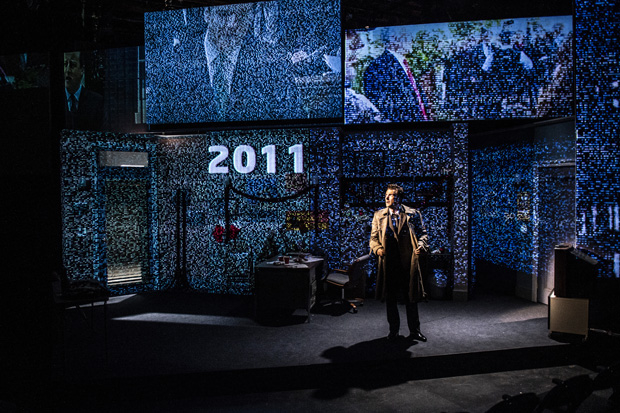A Rose Isn't Just a Rose in Labour of Love

(© Teresa Castracane)
Politics and romance are unlikely bedfellows in Labour of Love, making its US debut at Olney Theatre Center. Written by highly prolific and lauded playwright James Graham, this British play won the Olivier Award for Best New Comedy this year, and even though Graham is famed across the pond, it's a bold venture bringing this show to Olney's intimate Mulitz-Gudelsky Theatre Lab. Under the direction of Leora Morris, though, this witty play about British politics feels approachable and right at home in an American theater.
Labour of Love opens in 2017 in the humble office of Labour Party MP (member of Parliament) David Lyons (M. Scott McLean) as he faces down a surprising defeat from the conservative Tory Party candidate. His loss feels tempered by a slight twinkle of relief as he debriefs with his longtime constituency manager Jean (Julia Coffey) on his tenure in office since 1990. The first act takes audiences back in time with each scene to different points in David's career as the MP in North Nottinghamshire, a run-down former mining town in desperate need of a new industry to help it become prosperous again. These flashbacks show David, and his pretentious wife Elizabeth (Tessa Klein), discovering that this post might be a stepping-stone to bigger political opportunities. It also shows his continual failings, which make sense of his present-day defeat. The second act starts where the first ends — the day in 1990 when David won his seat — and makes its way to the present, this time focusing less on strictly the political and more on the personal, specifically his "will they won't they" relationship to Jean.
Julia Coffey, who is in pretty much every scene, steals the show with her impeccable comic timing as David's no-nonsense, salt-of-the-earth adviser. A bit bawdy and dynamic, she is also the cast member with the strongest ability to show emotionally and physically who her character is at different points of time in the play, even with the show's reliance on a multitude of costumes and props to project jumps in time. As David, the unassumingly charming M. Scott McLean starts out feeling a bit inscrutable in the first act, with the actor seemingly more caught up in the delivery of information and jokes than he is in conveying who David is as a person, aside from his political position. It's in the second act where McLean's performance, and the play itself, finds its emotional footing, with David delivering some excellent monologues to Jean in which he explains his passion and vision for local politics and shows a bit of humanity in scenes involving his estranged wife. Though there are very good supporting performances from Marcus Kyd as Len, a political competitor of David's; Emily Kester as Margot Midler, a young staffer; and Brian Kim as foreign investor Mr. Shen, this play belongs to Coffey and McLean, with their chemistry carrying audiences through the sometimes sluggish first act.
Daniel Ettinger's seemingly straightforward office set comes alive with the jumps back and forth in time. The attention to detail is flawless, from the various technological devices created and used between 1990-2017, to the posters on the wall expressing changing slogans and visions of a town in decline. The costumes by Sarah Cubbage also do a lot of work to indicate the time periods in ways that sometimes feel on the nose — those highly exaggerated shoulder-pad-clad suits, especially — but mostly are spot-on indicators of trends of the time and, more importantly, how the characters evolve throughout the show.
While there are indications within the play program and an audio welcome by Olney's artistic director, Jason Loewith, that this comedy about British politics has significant parallels to politics in America, that's only slightly true. There's an interesting exchange in the second act about divisions within the Labour Party that remind one of Bernie vs. Hillary debates, but beyond that, the political connections aren't really there. Nevertheless, it's an adventurous choice to bring a romantic comedy that puts most of its attentions onto British politics to a suburban US theater. Some regular audiences may be confused by many of the political references, but the play itself (and extensive information in the program) does a good job of explaining the context. It's also refreshing to see a British political play in America that's not interested in dwelling whatsoever on the royal family. Mostly, though, it's nice to be able to have art about politics that is capable of making audiences laugh. At its heart, Labour of Love is a play about local politics and people with a passionate interest in it and in each other. That's a topic that feels easy to translate.










